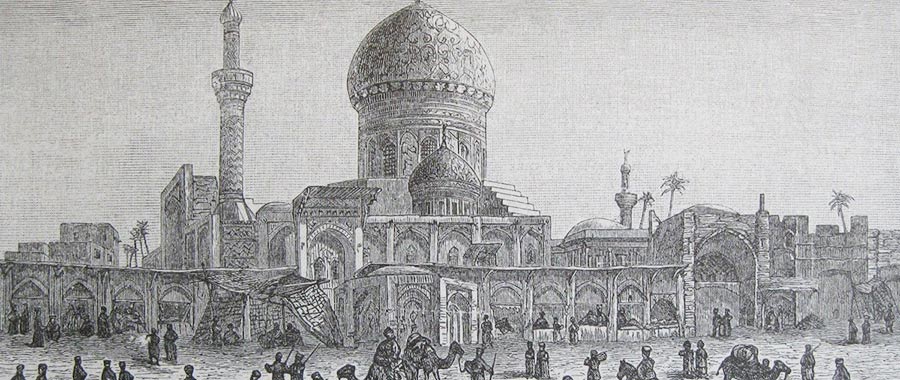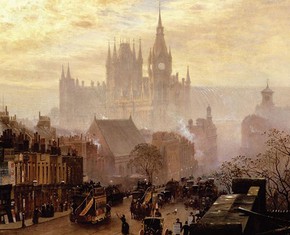The views expressed in our content reflect individual perspectives and do not represent the authoritative views of the Baha'i Faith.
Without telling anyone about his mystical, revelatory experience in prison, Baha’u’llah began to teach and write about the human spirit.
After his group of 70 followers and family reached their destination on April 8, 1853, Baha’u’llah established a residence in an old quarter near the center of Baghdad, the city the Qur’an calls the “Abode of Peace.” His health compromised by the long journey and still suffering from the aftereffects of his imprisonment; the bulk of the Babis either killed, jailed or scattered geographically; the forces and resources of the Bab’s nascent revelation at their lowest ebb; some predicted that Baha’u’llah’s exile to Baghdad would seal its fate and crush its hopes. The Guardian of the Baha’i Faith, Shoghi Effendi, later wrote that the Babi community had reached its nadir:
Never had the fortunes of the Faith proclaimed by the Bab sunk to a lower ebb than when Baha’u’llah was banished from His native land to Iraq. The Cause for which the Bab had given His life, for which Baha’u’llah had toiled and suffered, seemed to be on the very verge of extinction. Its force appeared to have been spent, its resistance irretrievably broken. Discouragements and disasters, each more devastating in its effect than the preceding one, had succeeded one another with bewildering rapidity, sapping its vitality and dimming the hope of its stoutest supporters. – Shoghi Effendi, in his epilogue to The Dawn-Breakers, p. 651.
Baha’u’llah upon His arrival in Baghdad … found among His countrymen residing in that city no more than a single Babi, while in Kazimayn inhabited chiefly by Persians, a mere handful of His compatriots remained who still professed, in fear and obscurity, their faith in the Bab.
The morals of the members of this dwindling community, no less than their numbers, had sharply declined. Such was their “waywardness and folly,” to quote Baha’u’llah’s own words, that upon His release from prison, His first decision was “to arise … and undertake, with the utmost vigor, the task of regenerating this people.” – God Passes By, p. 113-114.
In Baghdad Baha’u’llah initiated the process of his revelation to humanity by revitalizing the Babi Faith. For the next decade, from 1853 until his subsequent exile to Constantinople in 1863, the underpinnings of the Baha’i Faith gradually began to emerge in that ancient city:
From it radiated, wave after wave, a power, a radiance and a glory which insensibly reanimated a languishing Faith, sorely-stricken, sinking into obscurity, threatened with oblivion. From it were diffused, day and night, and with ever-increasing energy, the first emanations of a Revelation which, in its scope, its copiousness, its driving force and the volume and variety of its literature, was destined to excel that of the Bab Himself. Above its horizon burst forth the rays of the Sun of Truth, Whose rising glory had for ten long years been overshadowed by the inky clouds of a consuming hatred, an ineradicable jealousy, an unrelenting malice. – Ibid., p. 109.
Several striking events took place during Baha’u’llah’s ten years in Baghdad, but let’s look at just one of them in this installment: the first emanations from his astonishingly prolific pen.
Most importantly during the Baghdad period, Baha’u’llah began to write. But this unschooled young man did more than just write—he penned an entire universe. Beginning with a 19-couplet poem he started in prison in Tehran called The Sprinkling of the Cloud of Unknowing (Rashh-i-‘ama), he centered his thoughts and his pen on the mystical realities of the human spirit, attempting to regenerate the demoralized and almost defunct Babi community and inspire them to walk the spiritual path.
Baha’u’llah’s writings came to him in a flood of inspiration and revelation:
So prolific was this period … the unrecorded verses that streamed from His lips averaged, in a single day and night, the equivalent of the Qur’an! As to those verses which He either dictated or wrote Himself, their number was no less remarkable than either the wealth of material they contained, or the diversity of subjects to which they referred. – Ibid., pp. 137-138.
Baha’u’llah soon eclipsed his mystical poetry with an outpouring of many other deeply spiritual volumes—letters, tablets, treatises, epistles, prayers, odes, written responses to questions from the Babis and others, and entire books. During the Baghdad period he wrote some of the most important of his writings—the short mystical treatises The Hidden Words, The Seven Valleys and The Four Valleys; letters and tablets like The Tablet of the Maiden and The Tablet of the City of Unity; and the book-length works The Gems of Divine Mysteries which deals with spiritual transformation and the dangers of reading scripture literally, and The Book of Certitude, which Shoghi Effendi called “Baha’u’llah’s masterly exposition of the one unifying truth underlying all the Revelations of the past.”
(If you’d like to read a more comprehensive listing and summary of Baha’u’llah’s writings during this early pre-Baha’i period, click here. You can also access this information in The Baha’i World, Volume 14, pp. 620-632.)
Writing his stunningly beautiful prose and poetry in both Arabic and Persian, Baha’u’llah’s prolific output and prodigious literary skills amazed and astonished those who read his work. In his introduction to The Hidden Words, he alluded to the source of those gifts:
This is that which hath descended from the Realm of Glory, uttered by the tongue of power and might, and revealed unto the Prophets of old. We have taken the inner essence thereof and clothed it in the garment of brevity, as a token of grace unto the righteous, that they may stand faithful unto the Covenant of God, may fulfill in their lives His trust, and in the realm of spirit obtain the gem of Divine virtue. – Baha’u’llah, The Hidden Words, p. 3.
Even after his mystical encounter with the Maid of Heaven while chained and imprisoned in the Black Pit, Baha’u’llah did not immediately reveal it to others. Instead, he kept it to himself, and only gradually began to allude to it and express it through his writings. Some were so struck by those writings that they immediately became personal disciples and followers of Baha’u’llah, even without meeting him.
So the sweeping, essentially mystical process destined to become the worldwide Baha’i Faith had its beginnings in Baghdad:
… finally, before the gaze of the diversified communities that dwelt within its gates, the first phase in the gradual unfoldment of a newborn Revelation was ushered in, the first effusions from the inspired pen of its Author were recorded, the first principles of His slowly crystallizing doctrine were formulated, the first implications of His august station were apprehended, the first attacks aiming at the disruption of His Faith from within were launched, the first victories over its internal enemies were registered, and the first pilgrimages to the Door of His Presence were undertaken. – Shoghi Effendi, God Passes By, p. 110.
















Comments
Sign in or create an account
Continue with Googleor